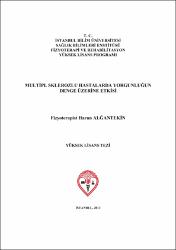Multipl sklerozlu hastalarda yorgunluğun denge üzerine etkisi
Künye
Alğantekin, Harun. (2013). Multipl Sklerozlu Hastalarda Yorgunluğun Denge Üzerine Etkisi. Yayımlanmamış yüksek lisans tezi. İstanbul : İstanbul Bilim Üniversitesi, Sağlık Bilimleri Enstitüsü.Özet
Multipl Sklerozlu (MS) hastalarda yorgunluk ve denge problemleri görülmekte ve bu problemler hastaların yaşam kalitesini olumsuz yönde etkilemektedir. Bu çalışma; MS’li hastalarda yorgunluğun denge üzerine etkisini araştırmak amacıyla yapılmıştır. Çalışmaya 20-60 yaş arasında, kesin MS tanısı almış, son 1 ay içerisinde atak geçirmemiş veya atak döneminde olmayan olgular alınıp, kalp, hipertansiyon, diabetes mellitus, hiperlipidemi, gibi sistemik hastalığı olan, kırık, amputasyon, konjenital problemler, spinal problemlere sahip olan, ileri kognitif yıkım ve ileri iletişim bozukluğu olan hastalar alınmamıştır.
Bireylerin demografik bilgileri alındıktan sonra, yorgunluk “Yorgunluk şiddet Ölçeği” (YŞÖ) ve “Yorgunluk Etki Ölçeği” (YEÖ) ve denge “Berg Denge Ölçeği” (BDÖ) ve “Tinetti Denge Ölçeği” (TDÖ) ve “Tinetti Yürüme Ölçeği” (TYÖ) kullanılarak değerlendirilmiştir. Nörolojik yetersizliğin seviyesi “Genişletilmiş Özürlülük Durum Ölçeği” (EDSS) ile belirlenmiştir.
Araştırma yaş ortalaması 36,98±9,74 yıl, hastalık süresi 6,10 ± 4,35 yıl (en az 1yıl – en fazla 17 yıl) olan 50 kişilik bir grup üzerinde yürütülmüştür. Araştırma sonunda “YEÖ” ile “BDÖ” ve “TYÖ” arasında anlamlı fakat düşük ilişki bulunmuştur. Çalışmada “YŞÖ” ile denge ölçekleri arasında ise istatiksel açıdan anlamlı bir ilişki saptanmamıştır. Çalışmanın bulguları MS’li hastalarda yorgunluk ve denge arasında anlamlı fakat düşük ilişki olduğunuortaya koymuştur.
Bu araştırma sonuçları yorgunluk ve denge arasında ilişki olduğunu göstermiş ve yorgunluğun giderilmesinin dengeyi geliştireceğini düşündürmüştür. MS’li hastalarda yorgunluk ve denge arasındaki ilişkinin daha kesin olarak belirlenebilmesi için uzun vadeli çalışmalar yapılması gereklidir. Fatigue and balance problems can be seen on the patients with Multiple Sclerosis (MS) and these problems affect the life standards of the patients negatively. This study is conducted to research the effect of fatigue on balance on the patients with MS. The study includes the patients at the age of 20 to 60, definitely diagnosed as patients with MS, have not had a seizure in the last month or are not in the period of seizure, and excludes patients with systemic disorders such as cardiac, hypertension, diabetes mellitus, hyperlipidemia, and the patients have anaclasis, amputation, congenital problems, spinal problems, severe cognitive deterioration, severe miscommunication.
After recording the demographic information of the individuals, fatigue is determined by using “Fatigue Severity Scale” (FSS) and “Fatigue Impact Scale” (FIS). Balance is determined by using “Berg Balance Scale” (BDI), “Tinetti Balance Scale” (TBS), and “Tinetti Gait Scale” (TGS). Neurological deficit level is determined by “Expanded Disability Status Scale” (EDSS).
The study is conducted on a group of 50 people with average age of 36.98±9.74 years, disease period of 6.10 ± 4.35 years (at least 1 year – at most 17 years). The study discovers that there is a significant but low correlation between “FIS”, and “BDI” and “TGS”. There is no statistically significant correlation between “FSS” and the balance scales. The findings of the study show that there is a significant but low correlation between fatigue and balance.
The results of this study show that there is a correlation between fatigue and balance and give rise to thought that the removal of fatigue may improve balance. Long term studies need to be conducted to determine precisely the correlation between fatigue and balance on the patients with MS.


















